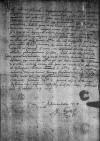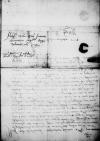List #376
Mercurino Arborio di GATTINARA do Ioannes DANTISCUSPalencia, 1527-10-07
Regest polski:
Gattinara dziwi się żalom Dantyszka odnośnie faktu, iż cesarz zakazał mu wstępu do Palencji. Podkreśla, iż nie jest to oznaka niełaski, lecz zabezpieczenie przed rozprzestrzenianiem się zarazy. Zwraca uwagę, iż taki sam zakaz otrzymał także poseł portugalski i zaleca podejść do tej sprawy bardziej racjonalnie.
Gattinara potwierdza aktualność wyjazdu cesarza z Palencji w najbliższy czwartek [.. października]. Sam planuje wyjazd tegoż dnia rankiem, albo dzień wcześniej. Zamierza zatrzymać się w czwartek na obiad w Palenzuela i zachęca Dantyszka, aby także tam przybył i odbył dalszą podróż do Burgos w jego towarzystwie, co da okazję do omówienia wszystkich spraw. Oświadcza, iż nie ma osoby, kórej chętniej powierzałby swoje myśli, niż Dantyszkowi.
Sugeruje, aby Dantyszek posłał do Burgos w sprawie przygotowania kwatery.
| odebrano Paredes de Nava, [1527]-10-08 Rękopiśmienne podstawy źródłowe:
Pomocnicze podstawy źródłowe:
Publikacje:
| ||||||||||||
Tekst + aparat krytyczny + komentarz Zwykły tekst Tekst + komentarz Tekst + aparat krytyczny Ekscerpty dotyczące podróży Dantyszka
Magnifico Viro, domino
Magnifice Domine uti frater honor(ande) or honor(andissime)⌈honor(ande)honor(ande) or honor(andissime)⌉ .
Responderem pluribus Dominationis Tuae queri written over e⌈eii written over e⌉moniae, ni existimarem ea omnia tibi notiora
esse, quam ut a me repetenda esse videantur.
Interea Dominatio Tua poterit aliquem ad
Vale.
Ad mandata Tuae Dominationis


 BCz 243, p. 70
BCz 243, p. 70